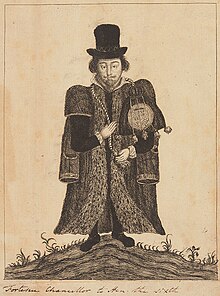John Fortescue
Appearance


Sir John Fortescue (c. 1394 – c. 1480) was an English lawyer, the second son of John Fortescue, of an ancient Devon family. He was born at Norris, near South Brent, Devon.
Quotes
[edit]- It is cowardise and lack of hartes and corage that kepeth the Frenchmen from rysyng, and not povertye; which corage no Frenche man hath like to the English man. It hath ben often seen in Englond that iij or iv thefes, for povertie, hath set upon vij or viij true men, at robbyd them al. But it had not been seen in Fraunce, that vij or viij thefes have ben hardy to robbe iij or iv true men. Wherefor it is right seid that few Frenchmen be hanged for robbery, for that they have no hertys to do so terryble an acte. There be therefor mo men hangyd in Eglnd, in a yere, for robberye and manslaughter, than ther be hangid in Fraunce for such cause of crime in vij yers.
- Reported in Winston Churchill's History of the English Speaking Peoples, Vol. I, p. p. 377.
- One would much rather that twenty guilty persons should escape the punishment of death, than that one innocent person should be condemned and suffer capitally.
- De laudibus legum Angliae (c. 1470), reported in Bartlett's Familiar Quotations, 10th ed. (1919).
- Moche Crye and no Wull.
- De laudibus legum Angliae (c. 1470), ch. x, reported in Bartlett's Familiar Quotations, 10th ed. (1919). Compare, "All cry and no wool", Samuel Butler, Hudibras (c. 1663), part i. canto i. line 852; see also more cry than wool.
- Comparisons are odious.
- De laudibus legum Angliae (c. 1470), ch. xix, reported in Bartlett's Familiar Quotations, 10th ed. (1919).
- Some men haue said that it were good for the kyng, that the commons of Englande were made pore, as be the commons of Fraunce. For than thai wolde not rebelle, as now thai done oftentymes; wich the commons of Fraunce do not, nor mey doo; for thai haue no wepen, nor armour, nor good to bie it with all. To theis maner of men mey be said with the phylosopher, ad pauca respicientes de facili ennnciant. This is to say, thai that see but few thynges, woll sone say thair advyses. For soth theis folke consideren litill the good of the reaume of Englond, wherof the myght stondith most vppon archers, wich be no ryche men. And yf thai were made more pouere than thai be, thai shulde not haue wherwith to bie hem bowes, arroes, jakkes, or any other armour of defence, wherby thai myght be able to resiste owre enymes, when thai liste to come vppon vs; wich thai mey do in euery side, considerynge that we be a Ilelonde ; and, as it is said before, we mey not sone haue soucour of any other reaume. Wherfore we shull be a pray to all owre enymyes, but yf we be myghty of owreself, wich myght stondith most vppon owre pouere archers; and therfore thai nedun not only haue suche ablements as now is spoken of, but also thai nedun to be much excersised in shotynge, wich mey not be done withowt ryght grete expenses, as euery man experte therin knowith ryght well. Wherfore the makyng pouere of the commons, wich is the makyng pouere of owre archers, shalbe the distruccion of the grettest myght of owre reaume.
- The Governance of England (Plummer, ed., 1885)
- "The Cheap Defence of England", in The Oxford Book of English Prose (1925), no. 15
- Gloss: jakkes) jackets of quilted leather · nedun) need


